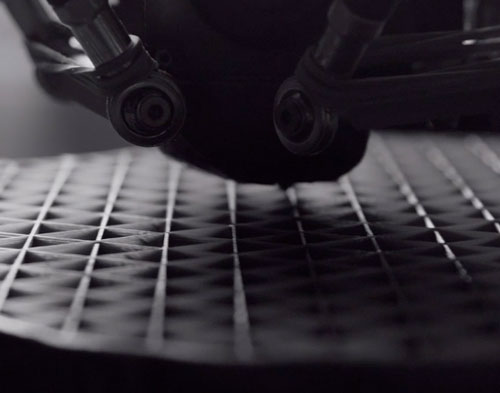XAL unveils 3D printing division

Austrian luminaire maker XAL has introduced a 3D printing division to create luminaires using sustainable materials.
The brainchild of XAL founder Andreas Hierzer, IQ Lux is promising to 3D print luminaires using recycled and bio materials such as PLA and regenerated PET.
The company showed some of its early creations – 3D printed pendants is a variety of materials and designs – on the brand’s stand at Light + Building exhibition in Frankfurt earlier this month.
Its range includes recessed and surface-mounted spotlights, track-mounted spotlights, suspended luminaires and retrofit downlights.
The company says it is ‘dedicated to CO2-neutral production, revolutionary engineering and innovative technology’.
The brand’s filaments – the rolls of source materials used by the 3D printer – are enhanced with bio-based natural and reclaimed materials including wood, concrete, graphite, ceramic, algae and soil. These elements often introduce striking colours and textures and nfuse the filaments with unique properties.
IQ Lux says that it uses streamlined processes with no unnecessary steps such as tooling, post-processing or complex manual assembly ensure maximum efficiency, even for smaller batch sizes.
The company says its operations at its factory in Graz, Austria, are powered solely with solar energy, achieving carbon neutrality as all our machines run on renewable power sourced on location.
XAL is one of the first big lighting brands to invest significantly in a 3D printing division. Signify has led the way in this space, with facilities in Maarheeze in the Netherlands and Burlington, Massachusetts, USA. It is planning more capacity in Noida, India and Jakarta, Indonesia.
Among the blue chip clients to have specified 3D printed luminaires are McDonald’s, Marks & Spencer and Everest Gyms.
Its latest range – dubbed the Essential series – has at least 55 per cent its filament made from materials derived from waste and residues of biological origin.
• A Recolight webinar – Bio Plastics for Luminaires – takes place on Thursday 20 June and will ask: Do bio-plastics stand up to scrutiny as a material for luminaire housings, components and optics? The speakers – who include Jamie Norris Green, founder, LumiAdd; Mark Shortland, managing director, Shoplight; and Julien Vassieries, chief executive officer and founder, Batch.Works – will look at plastics made biological substances and discusst the technical challenges in using them in the lighting industry. The panel will look at 3D printing with bioplastics as well as the opportunities with post-consumer plastics. Register free at https://www.recolight.co.uk/webinars/
• Diary date: Circular Lighting Live 2024, Recolight’s flagship conference and exhibition, takes place on Wednesday 9 October 2024 at the Royal College of Physicians in London. Free to specifiers, Circular Lighting Live 2024 will feature leading experts, specifiers and policy makers who will share their insights into forthcoming standards and legislation, emerging technologies and new business models. More info: www.circularlighting.live


